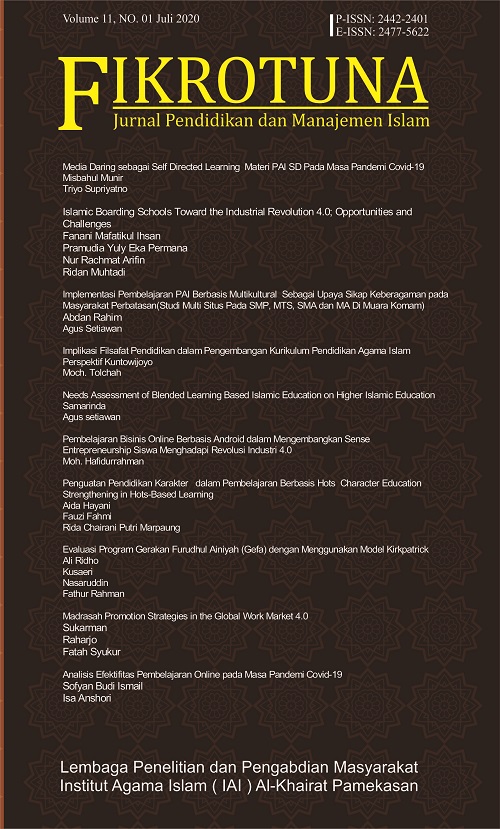Islamic Leadership Concepts and Theories
DOI:
https://doi.org/10.32806/jf.v16i02.5708Keywords:
Concept, Theory, LeadershipAbstract
Abstract: In this life, you need a leader to lead, guide and manage life because a leader is considered someone who can do these things. Leadership is a classic topic of discussion, but it is still very interesting to study because it determines the continuity of an organization. Leadership is essentially accountability, so a leader must understand the concepts and theories of leadership itself. From this, the purpose of this article research is to understand the concepts and theories of leadership. The type of research used is library research. The data collection technique uses documentation, which is a way to obtain data and information in the form of books and journal documents that can support research. The results of this research study show that the concept of leadership in Islam is identical to the term khalifa which means representative. Besides the caliph is also called Ulil Amri, which means the highest leader in Islamic society. In Islam, a person who becomes a leader must meet six requirements, namely: having strength, trustworthiness, the conscientiousness of conscience, being professional, not taking opportunities, and placing the most suitable and appropriate person. Thus, according to Islam, the ideal leader is fair, trustworthy, fathonah, shiddiq, qona'ah, siyasah, and patient. To be a leader, of course, it is not easy; there must be concepts and theories of leadership that are understood to be able to carry out their duties and have an impact on the surrounding environment. Therefore, it is important to understand the concepts and theories of leadership in life to be able to become a responsible leader and protect its members.References
Anoraga, Pandji. Manajemen Bisnis. Jakarta: Rineke Cipta, 2004.
Anton Atthoillah. Dasar-Dasar Manajemen. Bandung: CV Pustaka Setia, 2010.
Baharudin, and Umiarso. Kepempinan Pendidikan Islam: Antara Teori Dan Praktek. Yogyakarta: Ar Ruzz Media, 2012.
Connie, Chairunnisa. Manajemen Pendidikan Islam Dalam Multi Perspektif. Jakarta: Raja Grafindo Persada, 2016.
Gardner, John W. On Leadership. New York: The Free Presss, 1990.
Harnby, A.S. Oxford Edvanced Dictionary of English. London: Oxford University Press, 1990.
Hayati, Suparti Dwi. “Implementasi Model Kepemimpinan Untuk Meningkatkan Motivasi Kerja Karyawan Dalam Perspektif Islam,†no. agustus (2017): 1–45. http://repository.radenintan.ac.id/id/eprint/1126.
John, Echols M, and Shadily Hassan. Kamus Inggris-Indonesia. Jakarta: PT Gramedia Pustaka Utama, 1997.
Kristiadi. Kepemimpinan. Jakarta: LAN RI, 1996.
Mulyasa, E. Manajemen Berbasis Sekolah: Konsep, Strategi, Dan Implementasi. Bandung: PT Remaja Rosdakarya, 2004.
Pamuji. Kepemimpinan Pemerintah Di Indonesia. Jakarta: Bumi Aksara, 1995.
Siagan, Sondang. Teori Dan Praktek Kepemimpinan. Jakarta: Rineke Cipta, 2003.
Sinn, Ahmad Ibrahim Abu. Manajemen Syariah Sebuah Kajian Historis Dan Kontemporer. Jakarta: PT Raja Grafindo Persada, 2006.
Stoner, James A.F., and Edward Freeman. Management. New Jersey: Prentice-Hall International Inc, 1992.
Sugiyono. Metode Penelitian Kombinasi (Mix Methods). Bandung: Alfabeta, 2015.
Syahril, Sulthon. “Teori-Teori Kepemimpinan.†Ri’ayah 04, no. 02 (2019).
Syarifudin, Encep. “Teori Kepemimpinan.†Alqalam 21, no. 102 (2004): 459. doi:10.32678/alqalam.v21i102.1644.
Yulk, Gary A. Leadership Isn Organization. 2nd ed. New Jersey: Prentice-Hall Inc, 1989.
Downloads
Published
How to Cite
Issue
Section
License
Copyright (c) 2022 FIKROTUNA: Jurnal Pendidikan dan Manajemen Islam

This work is licensed under a Creative Commons Attribution-NonCommercial 4.0 International License.


.png)




